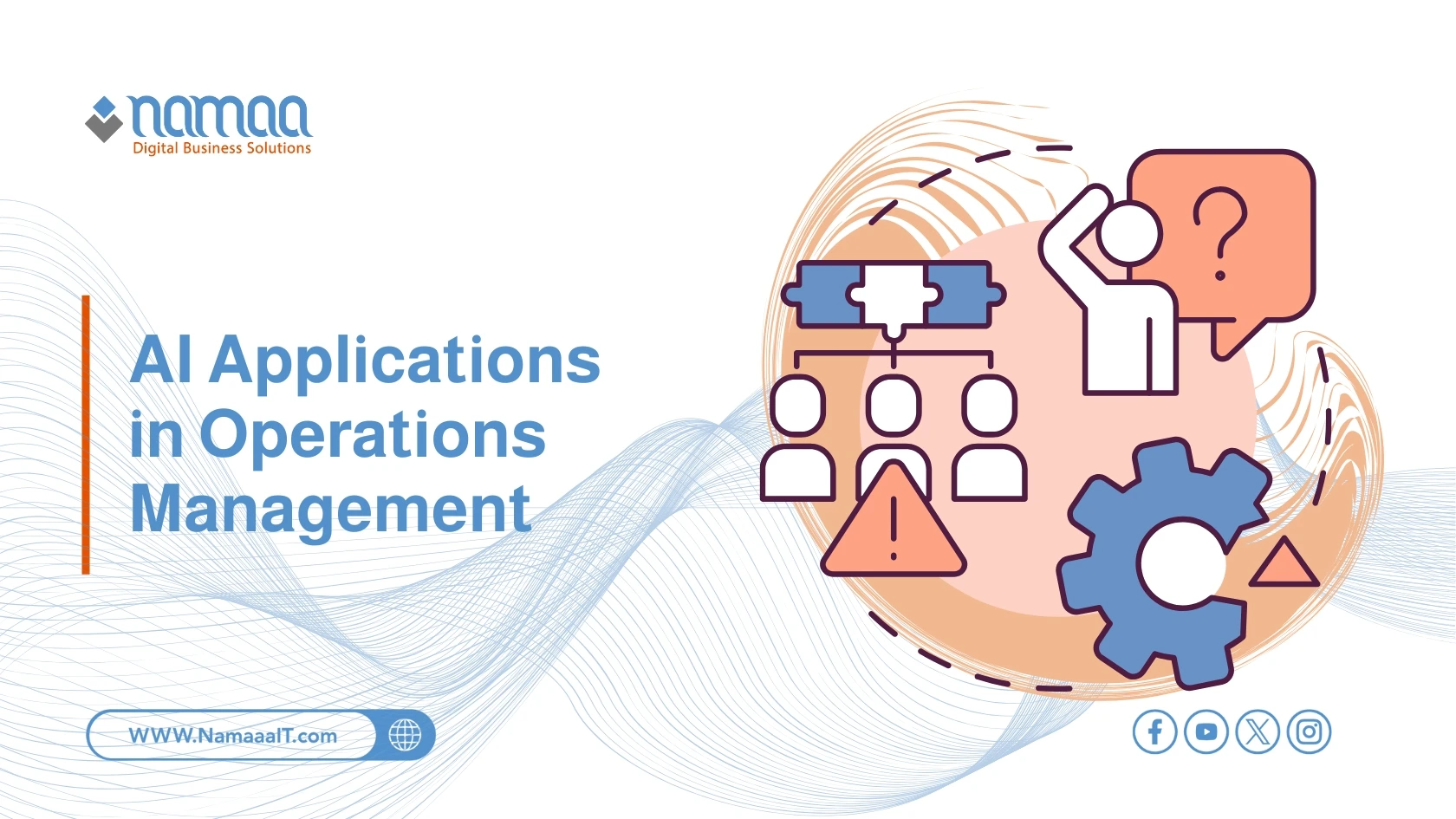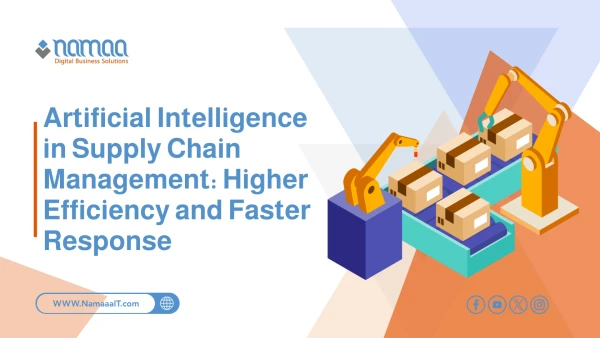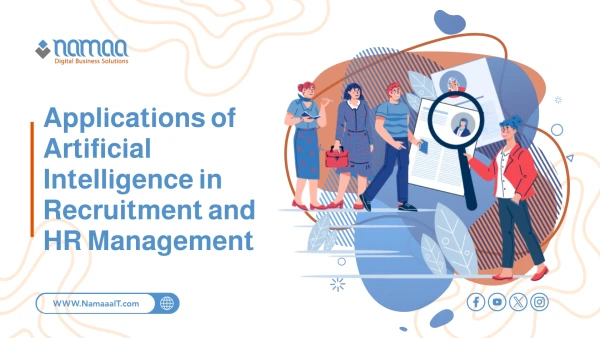Artificial intelligence (AI) applications in operations management are among the key technological developments that are driving significant progress in business execution and operational efficiency. By integrating AI technologies such as machine learning, predictive analytics, and intelligent automation, organizations are able to optimize their operations in unprecedented ways. These applications help enhance demand forecasting accuracy, improve inventory management, and automate routine processes—resulting in reduced costs and increased productivity.
For instance, in supply chain management, AI technologies are used to analyze big data and predict future needs, helping companies make informed decisions and improve their operational strategies.
AI applications in operations management go beyond improving efficiency—they also enhance the customer experience by offering personalized services and improving how businesses respond to changing market demands. As these technologies continue to evolve, the coming years are expected to bring more innovation in this field, opening up vast opportunities for organizations to achieve sustainable competitive advantages.
1. Intelligent Automation and Enhancing Operational Efficiency
Intelligent automation is one of the best applications transforming operational efficiency across many sectors. Technologies like Robotic Process Automation (RPA) automate routine and repetitive tasks such as data entry and transaction processing, allowing organizations to save employee time and reallocate resources to strategic tasks. According to a McKinsey report, intelligent automation can reduce labor costs by up to 30%, while improving process accuracy and minimizing human errors.
Studies show that automation can save up to 50% of time in daily operations. Additionally, a PwC report expects that by 2027, intelligent automation will be used in 70% of operations in large companies across various industries.
2. Predictive Analytics and Strategic Decision-Making
Predictive analytics is a powerful tool for strategic decision-making by offering accurate future insights based on available data. Many companies use this to improve demand forecasting and increase efficiency in inventory and sales. For example, Amazon uses machine learning algorithms to predict high-demand products, helping reduce inventory levels by up to 25%.
Retail companies leverage predictive analytics to refine marketing strategies, leading to revenue increases of 10–20%, according to Gartner. At the same time, these tools help reduce forecasting errors and improve decision accuracy. IBM studies indicate companies using predictive analytics improve decision-making by 30% compared to those that do not.
3. Enhancing Customer Experience with AI
Improving customer experience is a core part of advanced business strategies, and AI technologies enhance this experience through personalized, ongoing interactions. AI-powered chatbots using deep learning provide fast and accurate responses. For instance, Sephora uses AI chatbots that boosted customer engagement by 10% and increased sales by 25%.
A PwC study shows that 59% of consumers prefer companies offering personalized experiences—highlighting the need for AI technologies in tailoring offers and improving user experience. Companies adopting these tools report up to a 35% improvement in customer satisfaction.
4. Optimizing Supply Chains with AI
Supply chains have greatly benefited from AI, especially in improving inventory management and analyzing demand data to forecast future needs. Machine learning is used to analyze data and optimize purchasing and storage strategies. For example, Walmart leveraged AI to improve its supply chain, reducing inventory costs by 15%.
According to DHL, AI applications in supply chain management can increase efficiency by 30–40% through improved forecasting and waste reduction. Another study found companies using AI in their supply chains saw a 20% increase in delivery speed and a 25% reduction in wait times.
5. Predictive Maintenance Management Using AI
Predictive maintenance is one of the most effective AI applications in improving operational processes by forecasting equipment failures before they happen. Sensors and machine learning are used to monitor equipment conditions and analyze data in real time, helping companies improve maintenance operations and reduce unplanned downtime. For instance, GE uses AI to monitor its wind turbines, reducing failures by 10%.
McKinsey reports show that predictive maintenance can reduce maintenance costs by 12% and unplanned breakdowns by 50%. It’s projected that using AI in this area could save the industrial sector up to $30 billion annually by 2025.
6. Enhancing Logistics Operations with AI
AI plays a significant role in improving logistics operations through big data analysis, route planning optimization, and fleet management. For example, UPS uses AI to enhance delivery operations, reducing delivery times by 10% and cutting fuel costs by 12% through optimized shipping routes.
According to Accenture, applying AI technologies in transportation can boost efficiency by up to 30%, thanks to optimized routing and precise scheduling—leading to lower costs and increased productivity.
7. AI Applications in Smart Manufacturing
AI has revolutionized the manufacturing sector by improving production processes and ensuring quality. Companies like Siemens use AI to analyze sensory machine data and optimize performance. For example, Ford used AI to analyze production data, resulting in a 15% increase in manufacturing accuracy.
Studies suggest AI in smart manufacturing can improve efficiency by up to 40% in some operations. Looking ahead, companies are expected to invest up to $70 billion in AI technologies in manufacturing by 2030.
8. AI Applications in Human Resources
Many companies use AI to enhance HR processes such as recruitment and training. IBM, for example, uses AI to screen resumes and select top candidates based on past performance and competencies. Gartner reports that AI can improve recruitment quality by 20% by identifying better-matched candidates.
According to Forrester, applying AI in HR can cut hiring costs by up to 30%. It’s also expected to improve training and development effectiveness through personalized programs using machine learning tools.
9. AI Applications in Digital Marketing
AI enhances digital marketing effectiveness by providing precise insights into customer behavior and needs. Companies like Netflix and Spotify use AI algorithms to recommend content based on user behavior—boosting engagement by 30%.
McKinsey studies show that businesses using AI in digital marketing can increase ad revenue by 25%. It’s also expected that more companies will invest in AI tools to optimize marketing campaigns and improve customer targeting.
10. Applications of Artificial Intelligence in Healthcare
Artificial intelligence has become a key element in improving healthcare, as it contributes to enhancing disease diagnosis and providing personalized treatments. For example, Google Health uses deep learning techniques to analyze X-ray images and enable early diagnosis of diseases such as cancer. According to a study by The Lancet, the use of AI in cancer diagnosis can improve diagnostic accuracy by up to 10%.
AI in healthcare is projected to result in global cost savings of up to $150 billion by 2026, according to an Accenture report. It is expected that artificial intelligence will play a major role in enhancing healthcare and increasing the efficiency of medical services.
Ultimately, AI applications in operations management are among the most important tools that contribute to improving operational efficiency and boosting productivity across various industries. The continuous technological advancement in this field is expected to drive a deep transformation in how companies operate, helping them achieve sustainable competitive advantages.
Summary:
✅ Improved operational efficiency: Smart automation can reduce labor costs by up to 30% and enhance efficiency.
✅ Increased decision-making accuracy: Predictive analytics improve decision-making by up to 30% compared to companies that do not use such technologies.
✅ Enhanced customer satisfaction: Companies using AI to improve customer experience have seen a 25% increase in sales.
✅ Reduced inventory costs: AI applications in supply chains helped Walmart reduce inventory costs by 15%.
✅ Lower unplanned downtime: Predictive maintenance technologies have reduced unplanned breakdowns by 50%.
✅ Improved logistics efficiency: AI-driven route optimization helped UPS cut fuel costs by 12%.
✅ Higher efficiency in smart manufacturing: AI improved manufacturing quality by up to 15% at Ford.
✅ Enhanced recruitment and training: AI in HR can reduce hiring costs by up to 30%.
✅ Increased digital ad revenue: Companies relying on AI in digital marketing have seen a 25% increase in ad revenue.
✅ Significant savings in healthcare: AI in healthcare is expected to save $150 billion globally by 2026.





.webp)
.webp)
